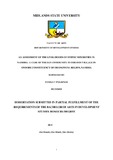Please use this identifier to cite or link to this item:
https://cris.library.msu.ac.zw//handle/11408/2042Full metadata record
| DC Field | Value | Language |
|---|---|---|
| dc.contributor.author | Puleinge, Tomas T. | - |
| dc.date.accessioned | 2017-06-14T14:54:46Z | - |
| dc.date.available | 2017-06-14T14:54:46Z | - |
| dc.date.issued | 2015 | - |
| dc.identifier.uri | http://hdl.handle.net/11408/2042 | - |
| dc.description.abstract | The importance of understanding the livelihood strategies of ethnic minorities has received a fresh impetus over the last few years with the emphasis by many Western donors on poverty reduction. This research aims to investigate livelihood strategies of San people in Oshandi village of Ondobe constituency in Ohangwena region in Namibia. Their economic, marginalization is compounded by their ethnic background a stigma that also marginalizes them politically and socially. It also examined the efforts that Namibian government and non state actors have made towards improving the livelihoods among the San community. Only samples of 15 San households were selected using purposive sampling. To achieve the objectives the researcher used both the qualitative research design which entailed the use of interviews, questionnaires and desk study. The results were based on the information captured in the questionnaires and qualitative face to face interactions. | en_US |
| dc.language.iso | en | en_US |
| dc.publisher | Midlands State University | en_US |
| dc.subject | Ethnic minorities, Namibia | en_US |
| dc.title | An assessment of the livelihoods of ethnic minorities in Namibia: a case of the San community in Oshandi village in Ondobe constituency of Ohangwena region | en_US |
| item.fulltext | With Fulltext | - |
| item.grantfulltext | open | - |
| item.languageiso639-1 | en | - |
| Appears in Collections: | Bachelor Of Arts In Development Studies Honours Degree | |
Files in This Item:
| File | Description | Size | Format | |
|---|---|---|---|---|
| Tomas T Puleinge. Final draft, Thesis 2015.pdf | Full Text | 929.3 kB | Adobe PDF |  View/Open |
Items in MSUIR are protected by copyright, with all rights reserved, unless otherwise indicated.



